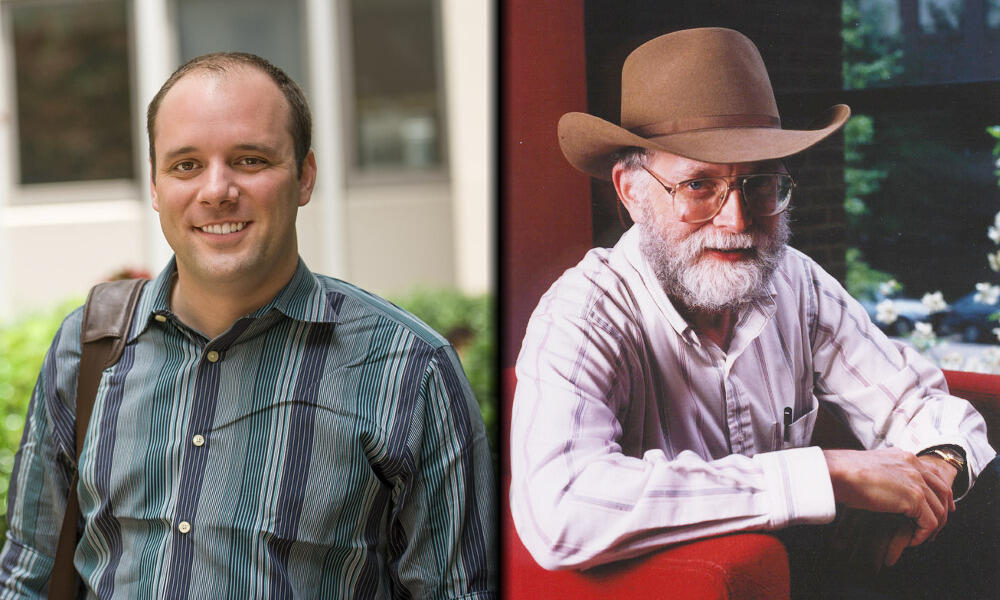
July 31, 2015
You asked, they answered: Faculty experts tackle questions from the VCU community
Share this story
The breadth of Virginia Commonwealth University’s faculty expertise is impressive. With more than 3,000 professors teaching almost every subject you can imagine, the university is a hotbed of knowledge and discovery.
But it’s not just the professors who have a thirst for knowledge – the entire VCU community is curious, inquisitive and passionate about learning. We recently spent two hot summer days outside on both the Monroe Park and MCV campuses flagging down passersby and challenging them to ask a question – any question – whether it was something they’d always wondered about or a question about a hot-button topic in the news. We then tracked down faculty members who could answer their questions.
The result? We got a lot of great questions on a wide range of subjects. Below and in the accompanying video, we’ve collected some of our favorites, along with answers from VCU faculty experts eager to share what they know.
The question: Why does feminism offend some people?

Archana Pathak, Ph.D., at right
The question asker: Julianna Lopez
The faculty expert: Archana Pathak, Ph.D., assistant professor of gender, sexuality and women’s studies, College of Humanities and Sciences
The answer: Feminism is a movement to end sexism, sexual exploitation and oppression.
—Bell Hooks, “Feminism Is for Everybody”
We are all taught to believe that much of life, especially things that have to do with human relationships and interactions, “are just the way things are.” We are often told things have always been a certain way or that something is just naturally occurring. We are rarely encouraged to ask why things are the way they are.
Feminism serves to question and problematize these everyday assumptions, particularly when it comes to sex, gender and sexuality. This questioning of social views and beliefs feels threatening and can make people anxious. People get offended because if things aren’t “just that way” then they have to consider the possibilities as to why things are the way they are. Also, as Peggy McIntosh explained in her classic 1988 essay “White Privilege, Male Privilege: Unpacking the Invisible Knapsack,” people feel offended because these beliefs of things just being the way they are may have given them a clear advantage, which they were strategically taught to not see. Feminism calls to question why certain groups hold certain advantages while others don’t. It pushes us to dismantle our assumptions and consider the complex ways in which power works in our world.
The question: What do the FIFA arrests mean for soccer?

Carrie LeCrom, Ph.D., at right
The question asker: Teri Dulong-Rae
The faculty expert: Carrie LeCrom, Ph.D., executive director, Center for Sport Leadership, School of Education
The answer: If anything, the recent FIFA arrests mean positive change is on the horizon for soccer across the globe. It has long been known that there was rampant corruption within FIFA itself, but because of the power and structure of the organization, few were hopeful that change was imminent. For years, officials had been buying votes, trading favors, falsifying information and the like. The arrests that resulted from extensive investigations into the FIFA organization, and the ultimate resignation of Sepp Blatter, demonstrate just how deep the corruption went, but should also be seen as a positive step forward — probably the most positive step that could have been taken.
While soccer’s popularity was never in question (it remains the most popular sport across the world), its sanctity was. How was soccer supposed to remain “the beautiful game” if its signature governing body was not treating it with respect? FIFA is certainly at a low point, but one that they needed to come to in order for trust and respect to return to the organization and the game. Ultimately, what do the FIFA arrests mean for soccer? They mean that the world’s game will continue to be watched and played by millions, and that those playing and watching can do it with the knowledge that the game is fair, is clean and is serving a purpose greater than the outcome on the field. Soccer can return to being seen as “the beautiful game” that does so much for so many people across the globe.
The question: With the recent events in Ferguson, Missouri, as well as the riots in Baltimore, could one conclude that we are in the middle of a second civil rights movement?

Brandi Summers, Ph.D., at right
The question asker: Marisha Downer
The faculty expert: Brandi Summers, Ph.D., assistant professor of African American studies, College of Humanities and Sciences
The answer: I hesitate to say that we are in the midst of a separate, or “second” civil rights movement. In many ways, the recent eruption of mass protests across the United States reflects the important and enduring legacies of the civil rights and black power movements of the mid-twentieth century. This surge in activism points to the persistence of structural issues still facing communities of color in the aftermath of the civil rights and black power eras. The protests in Ferguson and Baltimore have provided a contemporary context for challenging and reexamining police brutality — specifically extrajudicial violence against African-American women and men. Collectively, the demonstrations implicate poverty, black underemployment, housing discrimination, political disenfranchisement and mass incarceration as explicit acts of state violence. This is indeed a continuation of previous struggles.
There are certainly elements of the contemporary #blacklivesmatter movement that seek to reclaim the legacy of Dr. Martin Luther King Jr.’s political pursuits. The mainstream media still provide important visual narratives of demonstrations that are taking place all over the country, as they did in the past. Today, however, we are witnessing the increasing significance of social media in shaping not only how protesters (“rioters”) and their activities are framed, but also the mechanisms by which crucial information is disseminated to participants and to campaigns organized in solidarity with the #blacklivesmatter movement across the globe.
The question: Why do we move around when we’re thinking?

Ashlee Loughan, Ph.D., at right
The question asker: Jordan Stephens
The faculty expert: Ashlee Loughan, Ph.D., assistant professor of neurology, School of Medicine
The answer: “Methinks that the moment my legs begin to move, my thoughts begin to flow.”
—Henry David Thoreau
There are multiple philosophies as to why people move around while thinking. The most common explanation is psychological. Walking while thinking appears to be a way of coping with higher levels of anxiety. Pacing is thought to be a release of muscular tension or discomfort when one’s body is sending a signal to the brain that it is overwhelmed or uncomfortable. Research suggests that repetitive behaviors such as pacing back and forth or even doodling can help an individual manage their stress levels.
However, there is also a chemical viewpoint, which proposes that moving while thinking has a positive influence on our cognitive functioning. Physical activity increases blood circulation and oxygenation to the brain, which facilitates new connections and encourages the growth of neurons. This in turn enhances brain functioning such as memory and attention. In fact, recent investigations have suggested that the action of walking may increase an individual’s creative ideation, leading to a rise in mobile business meetings including the likes of the late co-founder of Apple, Steve Jobs, and Facebook’s Mark Zuckerberg.
So although pacing can be viewed as a sign of distress, it appears to be our body’s subconscious way of coping with anxiety-provoking situations and getting our creative juices flowing.
The question: How much advantage does a football team really gain from a deflated football?

Robert Gowdy, Ph.D., at right
The question asker: Brian Holmes
The faculty expert: Robert Gowdy, Ph.D., associate professor of physics and department chair, College of Humanities and Sciences
The answer: I am not sure the physics is what is important for the deflated football. In terms of physics, the main effect is on how far the ball can travel through the air.
The deflated football will have less air in it, but about the same volume since footballs do not stretch much when inflated. The air has mass, so less air means the football will have less mass but will still have about the same amount of air resistance when thrown. That means it could be thrown a bit harder but probably will not travel as far in a long pass. Kicking it would be worse since the lower pressure would probably make it flex more and lose more energy when it is kicked. It would not go as far.
The effect of physiology may be more important than the physics. The deflated ball is softer and therefore easier to grab and throw.
Note : All photos of question askers by Tom Kojcsich, VCU University Marketing
Subscribe to the weekly VCU News email newsletter at http://newsletter.news.vcu.edu/ and receive a selection of stories, videos, photos, news clips and event listings in your inbox every Thursday.
Subscribe to VCU News
Subscribe to VCU News at newsletter.vcu.edu and receive a selection of stories, videos, photos, news clips and event listings in your inbox.










